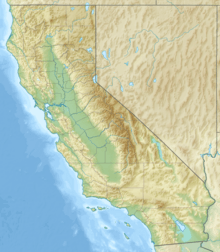Dunnigan Hills facts for kids
Quick facts for kids Dunnigan Hills |
|
|---|---|
| Highest point | |
| Elevation | 87 m (285 ft) |
| Geography | |
| Country | United States |
| State | California |
| District | Yolo County |
| Range coordinates | 38°47′39.646″N 121°57′18.888″W / 38.79434611°N 121.95524667°W |
| Topo map | USGS Zamora |
The Dunnigan Hills are a group of low, rolling hills located in northern Yolo County, California. These hills are not very tall, with the highest point reaching about 87 meters (285 feet) above sea level. They are an interesting part of the landscape in the wider Sacramento Valley area.
Contents
Exploring the Dunnigan Hills
The Dunnigan Hills are a unique natural feature in California. They offer a different kind of scenery compared to the state's famous tall mountains. These gentle hills are important for the local environment and agriculture.
Location and Landscape
The Dunnigan Hills are found in the northern part of Yolo County. This county is in the central part of California. The hills are part of the larger Sacramento Valley, which is a wide, flat area. The hills stand out from the flat valley floor.
The landscape of the Dunnigan Hills includes rolling slopes and open spaces. It's a place where you can see how the land changes from flat plains to gentle rises. This makes the area special for both nature and farming.
What is an AVA?
The northwestern part of the Dunnigan Hills is home to the Dunnigan Hills AVA. AVA stands for American Viticultural Area. This is a special type of geographic area. It is officially recognized for growing grapes for wine.
An AVA has specific climate and soil conditions. These conditions are perfect for certain types of grapes. The Dunnigan Hills AVA means that the hills have a good environment for vineyards. This shows how the land is used for agriculture.
Why AVAs are Important
AVAs help people understand where their wine comes from. They also tell them about the quality and style of the wine. Each AVA has its own unique features. These features affect how the grapes grow.
The Dunnigan Hills AVA highlights the agricultural importance of this region. It shows that even low hills can be very valuable. They contribute to California's famous farming industry.
Nature and Wildlife
Even though they are not huge mountains, the Dunnigan Hills support local wildlife. Many plants and animals call these hills home. The gentle slopes and open areas provide different habitats.
Local Ecosystems
The hills have a mix of grasslands and scattered trees. This creates a good environment for various species. You might find different types of birds, small mammals, and insects here.
The plants in the Dunnigan Hills are adapted to the local climate. This climate usually has hot, dry summers and mild, wet winters. These plants form the base of the local food web.
Protecting the Hills
Understanding the nature of the Dunnigan Hills is important. It helps us protect these areas. Even small natural spaces play a big role in the overall health of our planet.
The Dunnigan Hills are a quiet but important part of California's landscape. They show how diverse the state's geography is. From towering mountains to gentle hills, every part has its own story.


